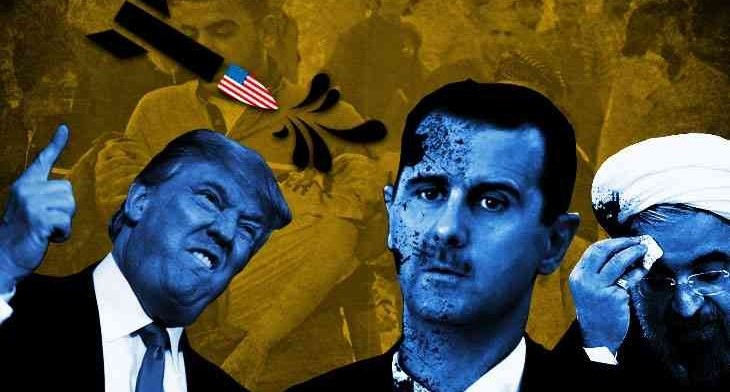
-By Professor Ramin Jahanbegloo, Vice Dean, Jindal Global Law School
The US missile attack on the al-Shayrat airbase in Syria on the night of 6-7 April in response to the Bashar al-Assad regime’s alleged use of chemical weapons has received positive reactions from Western politicians and commentators across the board.
Even those Americans and Europeans, who not long ago, were criticising Trump and had nothing but contempt for him, have suddenly changed the tone and appear more respectful after this show of lethal force.
Democrats and Republicans alike seem overjoyed that President Trump has shown that not only he is prepared to take the US back onto the attack, but also that he is coming back under the control of the American establishment.
In the words of former NATO commander James Stavridis: “With this tactically sound, professionally executed strike in response to significant human rights violations, President Trump shows above all that he is willing and able to take advice from the first-class national security team that he has assembled.”
CHANGING THE GAME
But the attack raises wider questions.
First of all, it changes the established image of Trump as an isolationist. There’s no doubt that the Trump’s presidency will look tougher than Obama’s in the next few years. Trump’s warlike posture to North Korea, his attack against Assad’s regime and last but not least his participation in the Saudi war on Yemen against Iran, all suggest that Trump is putting the last ambiguities of isolationism and his friendship with Putin behind him.
Secondly, last week’s missile attack against Assad’s regime have more broad impacts on the geopolitics of the Middle East. We should not ignore the fact that any open confrontation against Assad’s regime could bring the Americans one step nearer to confrontation with the Russians. Russian Prime Minister Dmitry Medvedev was no doubt pointing to an alarming confrontation between the two super powers when he said the attack took US force “within an inch” of military clashes with the Russians.
Thirdly, the US missile attacks might even have been a clear message sent to the Iranian authorities in relation with their involvement in Syria. Iran is the only Muslim and Middle Eastern regime which has been a major supporter of Bashar al-Assad, throughout its civil war in the past six years.
Iran’s decision to help Syria has been risky, but vital for the simple reason that Assad’s fall would have a dramatic impact on the Iranian foreign policy in the region and the overall balance of power in Middle East. It would not only it would not only undermine Hezbollah’s position in Lebanon, but it would also weaken weak the Iranian lethal potential against eventual Israeli attacks on Iran.
It goes without saying that the American missile attack is a direct intrusion against Iranian interests in Syria in particular and in the Middle East in general. Moreover, Tehran is in a position of having its back to the wall facing the hostility of Israel, Saudi Arabia and Turkey.
While in the past months the Turkish President Recep Tayyip Erdogan has been continually criticizing Iran, the Israeli Prime Minister Benjamin Netanyahu has considered the attack against the Syrian base as a direct message to Iran.
Last, but not least, Pakistan has joined Saudi Arabia’s military operations in Yemen by allowing its former chief of the armed forces, General Raheel Sharif, to accept the command of the Islamic Military Alliance to Fight Terrorism.
Notwithstanding these tensions, Iran appears to be moving towards greater accommodation with regional states. This new effort at partnership, following the nuclear deal between Iran and the US in Vienna in 2015, has been fruitful and transformative, reflecting changes in Iran from an insular security state to a regional power.
WHAT THE FUTURE MAY HOLD
If that’s indeed the case, one should be prepared to witness a heightened economic partnership between Iran and Europe, and also with some Arab states and India.
Some analysts still believe that there will be an escalation in Arab hostility to Iran to weaken Tehran’s hand, since the Gulf States have an innate fear of Iran’s re-emergence as a new regional policeman.
That is why, by sanctioning the Assad regime, Trump administration is thinking of targeting indirectly Iran. Congress is currently considering a broad sanctions bill targeting the Syrian government.
So the question to ask now is what this means for Iran’s future economic and political role in the region and the world? Does this mean that Iran and its allied Shia militants subject to sanctions because it has been orchestrating Assad’s war?
So the burning question remains: What future awaits Iran in the Middle East after the downfall of Assad?
The effort to cover and understand Iranian politics in the regional context might just reveal the tip of the iceberg regarding the conflicts, complexities and instabilities which continue to shatter and destroy the lives of millions in Syria, Iraq, Yemen and elsewhere in the region. How these issues will impact Israelis, Iranians, Turks and Arabs in the regions remains to be seen.
(The article was originally published in Catch News)


